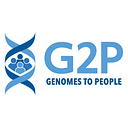Unlocking a cosmos of diversity within the profession of genetic counseling
Reaping the full benefits of personalized medicine requires a cadre of genetic counselors as diverse as our patients. We’re working on it.
Our genes have been described as “portals to the past,” constellations unlocking a cosmos of information about what makes us who we are. However, a concern with genetic testing is that not everyone will share equitably in the associated benefits, some will be stigmatized, and “the beauty of human diversity will be denigrated due to a narrowed definition of what is acceptable.”
One way to address this: The genetic counselors who discuss genetic findings with patients should resemble said patients’ diversity and that of the population at large. At present, to put it bluntly, they don’t. A 2021 North American survey by the National Society of Genetic Counselors (NSGC) found that 94% of respondents identified themselves as female and 90% were white and non-Hispanic.
Genetic counselors help patients navigate intimate conversations about their health and the health of their family as test results can bring relief or uncertainty. The aim of genetic counseling is to ensure that every person who pursues this testing can make informed decisions. Although genetic counseling may sound futuristic, it has existed as a profession for nearly 60 years. Genetic counselors receive specialized graduate training in human genetics and counseling in accredited two-year master’s degree programs. The profession is experiencing wild growth and is expected to expand by 100% over the next ten years.
While the movement towards personalized medicine is an exciting prospect, building trust with historically medically marginalized groups means having representation at all levels of care. We at the Genomes2People (G2P) program at Brigham and Women’s Hospital, Broad Institute and Harvard Medical School and our colleagues across this field are still working on it. Next month, G2P Director Dr. Robert Green will be a guest speaker for the Mass General Brigham Inaugural Conference on Achieving Research Equity and Inclusion. We acknowledge that our small efforts only begin to approach the attention that is needed in this area. However, the progress that has been achieved would not have been possible without strong partnerships with researchers and clinicians of color and community investment, which we greatly appreciate.
The PopSeq Project is aiding in the transformation of a history of heart disease into a legacy of heart health by being the first to return actionable genomic results related to hereditary cancer and heart disease to the all-African American cohort in the Jackson Heart Study in Mississippi. Participants will be referred to appropriate medical care to manage and reduce disease risk, and we will measure outcomes associated with returning results in this population for the first time.
The PeopleSeq Consortium facilitates and subsidizes genomic testing for Black individuals who are interested in personal genome sequencing, but otherwise cannot access this opportunity. The initiative is led by diversity consultants and provides genetic counseling and clinical genomic testing for interested Black individuals. Participants can also complete surveys on the medical, behavioral and economic impacts of sequencing.
The “BabySeq2” Project is a follow-up to our groundbreaking BabySeq Project, the first to study genomic sequencing in healthy infants. BabySeq2 will enroll 500 babies from minority backgrounds in Boston, New York City and Birmingham, Alabama to provide equitable access to this cutting-edge technology and study its impacts in a more representative cohort.
In 2021, G2P established a BIPOC research training program that provides funded internships to student researchers from underrepresented groups. The inaugural class of three students included a medical student, a healthcare professional, and a primary teacher in the midst of a career change. This year, the program received over 70 applications and five students will receive full funding for their trainee experience.
Tala Berro, a former G2P genetic counselor who helped establish the program, said, “A lot of students may not be aware of medical genetics as a field or may have trouble getting first-hand experience in genetic counseling. Our goal in establishing this program was to offer an equitable experience — to allow students to work with us not because they know someone in the field, but because they are qualified and interested.”
The culmination of these efforts across North America will lead to a more diverse genetics workforce. The National Human Genome Research Institute (NHGRI) has a detailed agenda for recruiting individuals from underrepresented backgrounds into the genomics workforce beginning with grade school education. Fostering an inclusive space and promoting research internships is part of the second goal of the NHGRI’s mission. At each level of genetics education, doctors, genetic counselors, scientists, and researchers must address justice, equity, diversity, and inclusion within their home institutions.
While progress has been made towards equity in the field, many challenges remain before genetic counselors are reflective of the U.S. population. These changes will require the continued strong leadership of professional member organizations, such as the NSGC and the American College of Medical Genetics and Genomics, responsive and rapidly evolving curriculum taught in genetic counseling programs, and community-powered advocacy. Undoubtedly, the future of genetic counseling has the potential to unlock a cosmos of diversity to those who are truly inspired and ready to explore new frontiers within the profession.
Shardae Williams is a Genomes2People team member, lead for Diversity, Equity and Inclusion and Operations Coordinator.
The author gratefully acknowledges the contributions of Charlene Preys to this article.
